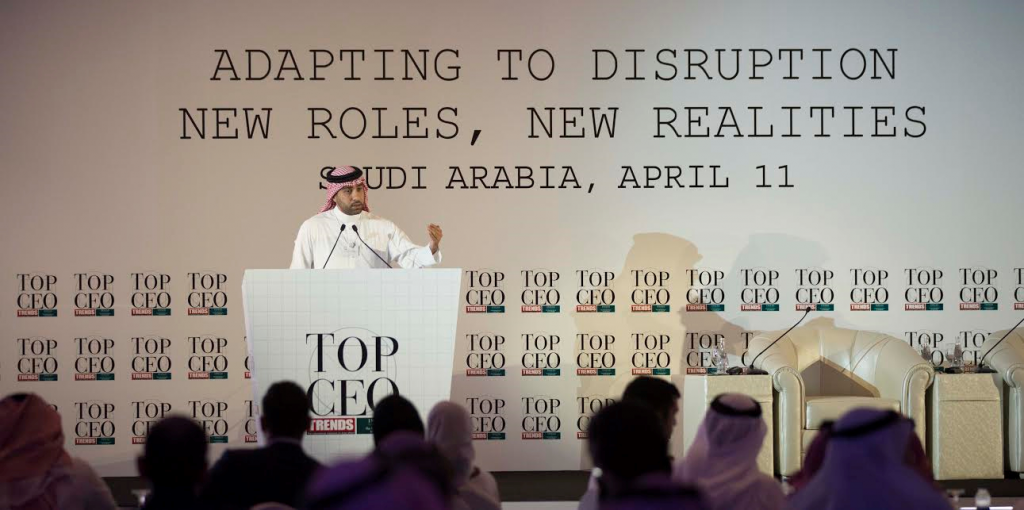
Third edition of Top CEO Conference 2017 draws to a spectacular close
The third edition of the Top CEO Conference drew to a spectacular close at Bay La Sun Hotel & Marina, King Abdullah Economic City (KAEC), where it made its Saudi Arabian debut. The annual event is organised by TRENDS magazine and INSEAD – the leading international business school – and serves to address the burning issues facing the corporate world today, with this year’s edition taking place under the theme ‘Adapting to Disruption: New Roles, New Realities’ to reflect the transformation in the way C-level executives and businesses prepare to make agile strides toward a sustainable future.
Julien Hawari, Co-Chief Executive Officer of Mediaquest, commented: “With a record number of CEOs and VPs from the Arabian Gulf region in attendance this year, the Top CEO Conference 2017 has been an open and productive discussion between thought leaders, executives and officials, framing global issues in a regional context to help businesses to navigate challenges, embrace a new reality, and take their organisations forward in the right direction. Key highlights on the successful 2017 agenda included ‘Big Data and Artificial Intelligence’, ‘Challenges of Slow Growth’, ‘New Technologies’ and Leadership 2.0.’”
“KAEC is very much at the heart of the conversation around the future of business in Saudi Arabia and the wider region,” said Fahd Al Rasheed, Group CEO and Managing Director of King Abdullah Economic City. “Our strategic position as the gateway into both the Saudi Arabian and the broader Red Sea markets makes us an ideal destination for businesses seeking to explore the potential of this fast-developing region. It has been a privilege to host the inaugural Top CEO Conference to be held on Saudi soil and we look forward to a fruitful relationship with this important thought leadership event.”
The ‘Big Data and Artificial Intelligence’ session was hosted by Justine Cassell from the Human Computer Interaction Institute, who explored how AI and Big Data are transforming both business and society. The session shed light on the fantastic opportunities offered by machine learning and AI, while also assessing the risks involved in their adoption, including the potential replacement of jobs with algorithms and machines. Presenting feasible solutions, the session advocated building technology for good and encouraging better global cooperation by infusing human skills into AI.
A panel discussion on ‘Challenges of Slow Growth’ was held between Dr Fahad M Alturki, Jadwa Investment; Dr Lama Al Sulaiman, Jeddah Chamber of Commerce; Eng. Yasser Joharji, Nahdi Medical Company; Irene Mia, The Economist Group; Khalid Suleiman Aljasser, Arabian Centres; Khalid Al Rumaihi, Bahrain Economic Development Board (EDB); and CEO of Mediaquest Julien Hawari. The panel addressed the end of the GCC’s era of abundance and the urgent need to enable sustainable growth and implement pragmatic strategies, with a discussion on the government reform programmes that have been put in place to stabilise the economy, and the importance of collaboration if businesses are to face the changing scenario and counter the slowdown. Offering a silver lining, the session also provided insights into the possible advantages of slower growth in the GCC region.
The ‘New Technologies’ panel discussion saw dynamic debate related to the digital Fourth Industrial Revolution, between Justine Cassell, Human Computer Interaction Institute; Issam AbdulRahim Kazim, Dubai Corporation for Tourism and Commerce Marketing; Anand Vengurlekar, INSEAD; Ronaldo Mouchawar, Souq.com; Majed Al Suwaidi, Managing Director of Dubai Media City, Dubai Studio City and Dubai Production City; and Samer Bohsali from Strategy&. Going beyond digital disruption in the virtual world, the panel considered the real world impact of technological advances such as 3D printing. The discussion addressed the increasingly rapid rate of progress that will be witnessed over the next five years, which will see virtual technologies becoming a reality with the inevitable adoption of machine learning. It also explored the magnitude and regional impact of this upcoming change.
‘Leadership 2.0’ saw a panel discussing the new generation of business leaders, who will be required to operate in an ever more complex, competitive and social-media-heavy environment. Expert opinions were shared by the speakers including Dr Ashraf Gamal El Din, Hawkamah; Huda AlLawati, Savola Group; Sushant Upadhyay, Aon Hewitt; Dr Lama Al Sulaiman, Jeddah Chamber of Commerce; Hassan M Fattah, Brunswick; and Prof. Miguel Sousa Lobo from INSEAD. The session presented methods for leaders to take their businesses to the next level, by walking the talk and driving their companies’ transformation independently – a challenge that will require higher levels of strategic flexibility, a new emphasis on building trust between senior leadership and younger employees, and concerted efforts to stimulate leadership growth via SMEs and entrepreneurial ventures.
The Top CEO Conference has once again been a huge success, cementing its position as an essential leadership event for GCC business leaders. With businesses in the GCC and the Middle East at a significant turning point, this year’s agenda has addressed the most urgent issues, assessed their regional impact, encouraged a dialogue among industry experts, and provided valuable insights into what lies ahead. Most importantly, we have left the conference with forward-thinking solutions that will shape the future of business in the region for the better.


























